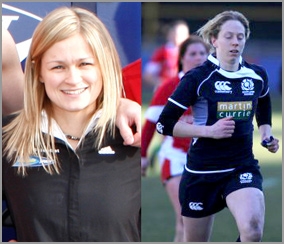Expert tips for game day preparation
Sports scientist Tessa Morris (pic left) and Scotland women's rugby international Lynsey Douglas (pic right) work together for Lucozade Sport. They give us their top tips for preparing for rugby matches at all levels.
Published by Lynsey Douglas, November 1, 2010
5 minute read

My recent experience playing at the Women's Rugby World Cup made me think about how to best prepare for a rugby match, and a basic but important part of this is what and when to eat and drink.
From playing with various squads and at different times of the day, I think its something we all struggle to get right.
Therefore Tess Morris, a Sports Scientist working within the Premier League, and myself have joined together using our experience (post Sport Science degrees and MScs) at Lucozade Sport and have tried to make sense of the standard nutritional guidelines, to provide a few simple tips that we can all implement in our training or matches.
For a typical 2pm kick off, here is our rough guide to what and when to eat / drink from the day before until after the game. Everyone has individual preferences so find a strategy that works for you.
Day before the game
While you are asleep your bodys metabolism continues to work and therefore carbohydrate naturally depletes overnight. Consuming high carbohydrate meals and a sufficient amount of food in general the day before will help to maintain muscle and liver glycogen / carbohydrate levels and therefore store energy ready for your match.
If you are dehydrated this can seriously affect your mental and physical performance. A drink with higher salt / electrolyte content will retain the water and help you to wake-up better hydrated. Drinking only water often means the body does cannot hold onto it, and it is soon excreted.
Before the game
Breakfast consume a high carbohydrate breakfast, typically a wholegrain cereal with semi-skimmed milk or porridge or wholemeal bread are low GI, so will release energy throughout the day.
Keep a drinks bottle with you the morning before a match and try to drink around 500ml in the 2 hours before the match, try a sports drink (or low calorie version) which includes electrolytes to help you retain the fluid you are drinking.
Your urine should be a pale yellow colour, which indicates you are hydrated.
Eat a snack or small lunch around 2-3 hours before the match sandwiches, bagels, wraps with a protein based filling as well as fruit and cereal bars will all help to provide the energy needed for a match.
During the game
Drink plenty of fluid, making the most of breaks in play during the match, ensuring to take on electrolytes to help avoid dehydration.
As a match lasts longer than 60 minutes you should consume carbohydrate during the match, this can be from sports drinks, or snacks at half time such as jelly beans, carb gels or snack bars.
After the game
Try to weigh yourself before and after training and games (in just your underwear). Any weight lost is simply down to your sweat rate and will give you a good indication of how much you should be drinking during the game. For every 1kg lost, 1.5kg / 1.5litres should be replaced. In simple terms, you should be either the same weight or heavier after playing to keep hydrated.
Cool down prevents blood pooling, decreases lactate, returns the heart and adrenaline slowly to resting levels and overall reduces muscle soreness.
Consuming quality protein within 30 minutes encourages quicker muscle adaptation and recovery. A drink with 15 to 20g protein is the quickest to digest and 60 to 80g of carbohydrate is also important. This could be peanut butter on toast, cereal and a banana or a recovery product. You should continue refuelling every couple of hours.
Ice baths, compression garments and sleep are also recommended to help reduce muscle soreness and aid recovery for your next session.